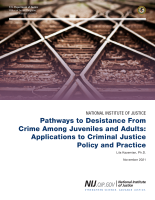Court facilities
Understanding the Impact of COVID-19 on Victim Services
The COVID-19 pandemic had a detrimental impact on communities across the nation and significantly affected various aspects of individuals’ lives. One of the negative impacts was an increase in gender-based violence accompanied by shifting barriers to accessing services and support. Victims and victim service providers faced various challenges dealing with the increase in need for services, navigating barriers to help-seeking, and addressing logistical issues.
See the YouTube Terms of Service and Google Privacy Policy
Tribal Crime, Justice, and Safety, Part 1
Research indicates that Native American persons experience crime victimization at higher rates than non-Native people. Furthermore, the unique position of American Indian and Alaska Native tribes as both sovereign nations and domestic dependents of the U.S. creates jurisdictional complexities in responding to crime, justice, and safety. Senior social and behavioral scientist Christine (Tina) Crossland discusses NIJ’s research on these topics, especially on the prevention of violence towards American Indians and Alaska Natives. Communications Assistant Stacy Lee Reynolds hosts.
Pathways to Desistance From Crime Among Juveniles and Adults: Applications to Criminal Justice Policy and Practice (Executive Summary)
Discussing the Future of Justice-Involved Young Adults
New science in brain development is transforming young adult involvement with the justice system. On Tuesday, September 8, Attorney General Loretta Lynch, Assistant Attorney General Karol Mason, and experts from NIJ and the Harvard Kennedy School Program in Criminal Justice who serve on the Executive Session on Community Corrections discussed the future of justice-involved young adults.
See the YouTube Terms of Service and Google Privacy Policy



